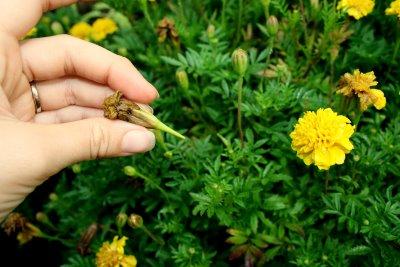
It's the time of year to assess your planters, window boxes and hanging baskets so they look good right through to fall.
A little effort now will really pay off later in the season!
The weather so far this summer has been so variable, that your planters may be showing signs of stress.
My shade pots look great but I have some planters in the front yard that need some work!
You may have long, leggy growth that needs to be trimmed back. Pruning always stimulates new growth.
By nipping off the ends of stems you will be encouraging the plants to bush out from the crown and along the stem length.
Most trailing plants benefit from regular pinching.
In fact, you can start pinching now even if you don't have any lanky growth.
This regular maintenance task will keep plants lush and full.
It's especially important for the vigorous Supertunias and Wave Petunias.
Some flowers have been blooming for a while now and have started to produce seeds.
Seed production takes a lot of energy from the plant.
For annuals, it triggers the ëend of the season.
By removing the spent flowers and newly forming seeds, plants get the signal to continue flowering.
Fertilizing is critical during the summer.
Rain and regular watering washes nutrients right through the soil, leaving little behind for plant growth.
If leaves are looking pale green or yellow and flowers have gotten smaller or sparse, it's a sure sign that nutrients are lacking.
Use water soluble fertilizer, as it is quickly absorbed by plant roots.
I fertilize often but give my planters and baskets an extra feed about a week before I am expecting company.
It is a great pick-me-up for the flowers!
Even if you plants are looking good now, regular fertilizing is still important.
You can use water soluble fertilizer 1/4 strength weekly for a nice, even feed.
As an alternative, apply slow release fertilizer pellets once.
Each time you water, as small amount of nutrient dissolves to feed your plants.
Now is the time to check your plants carefully for insect damage.
Slugs and earwigs can be a major problem.
Go out at dusk to pick the slugs and snails off the stems and leaves or use organic slug bait in covered containers near the pots.
Beer can also be used to attract and drown the slugs.
The yeasty smell will attract them.
Use bait stations or low shallow container as traps.
Set them out in the evening, collect and empty them in the morning.
Use soya sauce with a thin layer of oil over the surface for earwigs.
Also watch for aphids and caterpillars.
Deal with your insect problems quickly so that your whole pot is not ruined!
Keep an eye out for mold, Powdery Mildew and other disease problems on your annuals.
Unfortunately summer weather is a perfect breeding ground for disease.
Trim off badly diseased leaves and spray the plant with copper sulphate or sulphur. Both are natural fungicides.
If you have a lot of moldy leaves at the base of your plants, remove them, thin out stems if possible and reduce watering.
You need to give the soil and foliage a chance to dry out a bit.
Another caution with the cooler temperatures: sometimes a plan can wilt due to root rot when soil is too wet and cold.
You may automatically water more thinking you have a dry pot.
That just makes the problem worse!
If you have a plant that wilts, investigate carefully before watering. Give it a good soak if the rootball is very dry.
If the soil is still moist, allow it to dry out a bit.
Then water only when the soil approaches dryness, not daily if it's not required.
This may seem like a long list of chores, but you can do a bit at a time to make it manageable.
Believe me; the rewards will be worth the effort.
If containers need more of a boost, consider removing struggling plants and replacing them with some fresh flowers.
There are still lots of healthy annuals at local garden centres.
*************************
Read Susan Richards' column each week on our Editorials/Columns section.